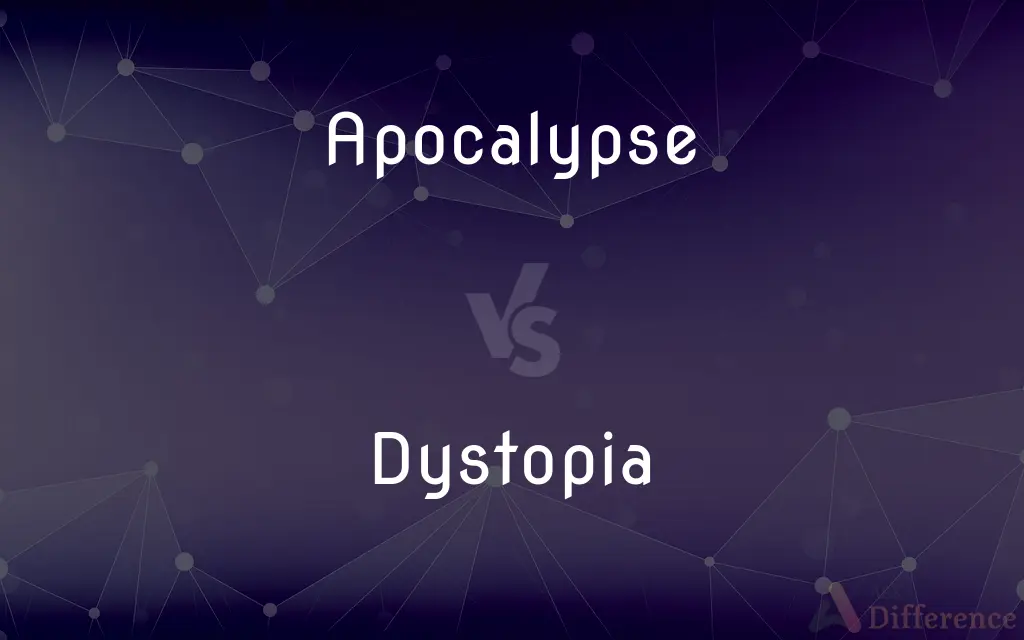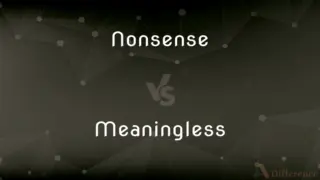Apocalypse vs. Dystopia — What's the Difference?
By Fiza Rafique & Maham Liaqat — Updated on May 17, 2024
Apocalypse refers to the complete destruction or end of the world, while dystopia describes a society characterized by suffering, oppression, or bleakness, often set in the future.

Difference Between Apocalypse and Dystopia
Table of Contents
ADVERTISEMENT
Key Differences
An apocalypse typically signifies a cataclysmic event leading to widespread destruction or the end of the world. It often involves natural disasters, wars, or supernatural events, marking a definitive end or dramatic transformation of civilization. Dystopia, on the other hand, depicts a society where oppressive control, suffering, and bleak conditions prevail, often set in the future or an alternate reality. Dystopias explore themes of totalitarianism, environmental collapse, or technological domination.
Apocalyptic scenarios focus on the events leading to massive destruction and the immediate aftermath, portraying the chaos and survival challenges faced by the remnants of humanity. In contrast, dystopian settings often explore long-term societal structures and the dehumanizing effects of extreme political or technological systems on individuals and communities.
In literature and media, apocalyptic narratives often emphasize the catastrophic event itself and its immediate consequences. Dystopian stories delve into the mechanisms of societal control and the everyday struggles of people living under such regimes, often critiquing contemporary social issues through their exaggerated portrayals.
While an apocalypse brings about a sudden, dramatic end, a dystopia presents a sustained environment of despair and hardship. Apocalyptic themes highlight the fragility of human civilization in the face of overwhelming disasters, whereas dystopian themes emphasize the dangers of unchecked power, loss of freedoms, and the erosion of human rights.
Apocalypses can be triggered by various causes, such as natural disasters, pandemics, or divine intervention. Dystopias are usually man-made, resulting from oppressive governments, corporate dominance, or technological advancements gone awry.
ADVERTISEMENT
Comparison Chart
Definition
Cataclysmic event leading to widespread destruction or end of the world
Society characterized by suffering and oppression
Focus
Destruction and immediate aftermath
Long-term societal structures and control mechanisms
Common Themes
Natural disasters, wars, supernatural events
Totalitarianism, environmental collapse, technological domination
Narrative Emphasis
Catastrophic events and survival challenges
Societal control and individual struggles
Nature
Sudden and dramatic end
Sustained environment of despair and hardship
Causes
Natural, supernatural, or human-triggered
Man-made, often political or technological
Compare with Definitions
Apocalypse
A revelation or disclosure of great significance.
The ancient text prophesied an apocalypse revealing hidden truths.
Dystopia
A society characterized by human misery, oppression, and suffering.
The novel depicts a dystopia where citizens have no personal freedoms.
Apocalypse
The end of the world as depicted in religious texts.
The Book of Revelation describes an apocalyptic vision of the end times.
Dystopia
A critique of current social, political, or economic trends.
The story's dystopia reflects the author's concerns about corporate dominance and environmental degradation.
Apocalypse
A drastic and significant change.
Climate scientists warn of an environmental apocalypse if current trends continue.
Dystopia
A society that is undesirable or frightening.
The author's depiction of a dystopia serves as a warning about the dangers of unchecked power.
Apocalypse
A catastrophic event resulting in widespread destruction or the end of the world.
Many fear a nuclear apocalypse could devastate the planet.
Dystopia
A fictional setting with a repressive and controlled state.
The protagonist struggles to survive in a dystopia governed by a tyrannical regime.
Apocalypse
An apocalypse (Ancient Greek: ἀποκάλυψις apokálypsis, from of/from: ἀπό and cover: κάλυψις, literally meaning "from cover") is a disclosure or revelation of great knowledge. In religious concepts an apocalypse usually discloses something very important that was hidden or provides what Bart Ehrman has termed, "A vision of heavenly secrets that can make sense of earthly realities".
Dystopia
A dystopia (from Ancient Greek δυσ- "bad, hard" and τόπος "place"; alternatively cacotopia or simply anti-utopia) is a fictional community or society that is undesirable or frightening. It is often treated as an antonym of utopia, a term that was coined by Sir Thomas More and figures as the title of his best known work, published in 1516, which created a blueprint for an ideal society with minimal crime, violence and poverty.
Apocalypse
Apocalypse Abbr. Apoc.(Bible) The Book of Revelation.
Dystopia
An imaginary place or state in which the condition of life is extremely bad, as from deprivation, oppression, or terror.
Apocalypse
Any of a number of anonymous Jewish or Christian texts from around the second century BC to the second century AD containing prophetic or symbolic visions, especially of the imminent destruction of the world and the salvation of the righteous.
Dystopia
A work describing such a place or state
"dystopias such as Brave New World" (Times Literary Supplement).
Apocalypse
The end of the world, especially as described in one of these texts.
Dystopia
A vision of a future that is a corrupted (usually beyond recognition) utopian society.
Apocalypse
A great catastrophe that results in widespread destruction or the collapse of civilization
"The United States was calling in air strikes and heavy armor until we had the feeling that the whole thing was going to end in apocalypse" (Phillip Robertson).
Dystopia
A miserable, dysfunctional state or society that has a very poor standard of living.
Apocalypse
A prophetic disclosure; a revelation.
Dystopia
(pathology) Anatomical tissue that is not found in its usual place.
The patient suffers from adrenal dystopia.
Apocalypse
A revelation, especially of supernatural events.
The early development of Perl 6 was punctuated by a series of apocalypses by Larry Wall.
Dystopia
State in which the condition of life is extremely bad as from deprivation or oppression or terror
Apocalypse
(Christianity) The unveiling of events prophesied in the Revelation; the second coming and the end of life on Earth; global destruction.
Dystopia
A work of fiction describing an imaginary place where life is extremely bad because of deprivation or oppression or terror
Apocalypse
(Christianity) The Book of Revelation.
Dystopia
An imagined future society with severe societal and environmental issues.
The film shows a dystopian future where technology controls every aspect of life.
Apocalypse
A disaster; a cataclysmic event; destruction or ruin.
Apocalypse
One of a numerous class of writings proceeding from Jewish authors between 250 b. c. and 150 a. d., and designed to propagate the Jewish faith or to cheer the hearts of the Jewish people with the promise of deliverance and glory; or proceeding from Christian authors of the opening centuries and designed to portray the future.
Apocalypse
Specifically, the revelation delivered to St. John, in the isle of Patmos, near the close of the first century, forming the last book of the New Testament (called Revelation or the Apocalypse).
Apocalypse
Anything viewed as a revelation, especially one that is highly significant for the person receiving it; a disclosure. Often used of a realization or revelation that changes a person's goals or style of life.
The new apocalypse of Nature.
Apocalypse
The final battle between good and evil, as foreseen in Saint John's Apocalypse; the time when God conquers the powers of evil, attended by cataclysmic cosmic events, and sometimes thought of as the end of the world; an Armageddon.
Apocalypse
A cosmic cataclysm in which God destroys the ruling powers of evil
Apocalypse
The last book of the New Testament; contains visionary descriptions of heaven and of conflicts between good and evil and of the end of the world; attributed to Saint John the apostle
Apocalypse
A scenario involving global disaster and societal collapse.
The movie portrayed a post-apocalyptic world ravaged by zombies.
Common Curiosities
What is an apocalypse?
An apocalypse is a catastrophic event leading to widespread destruction or the end of the world.
What are common themes in apocalyptic stories?
Common themes include natural disasters, wars, supernatural events, and survival.
What are common themes in dystopian stories?
Common themes include totalitarianism, environmental collapse, and technological domination.
What is the purpose of dystopian fiction?
Dystopian fiction often serves to critique contemporary social, political, or economic issues.
Can a dystopia occur after an apocalypse?
Yes, a dystopian society can emerge in the aftermath of an apocalyptic event.
Is an apocalypse always sudden?
Generally, apocalypses are sudden and dramatic, marking a definitive end or transformation.
Can a story be both apocalyptic and dystopian?
Yes, a story can feature apocalyptic events leading to a dystopian society.
How does a dystopia differ from an apocalypse?
A dystopia is a society characterized by suffering and oppression, while an apocalypse involves a catastrophic event causing massive destruction.
What is a post-apocalyptic setting?
A post-apocalyptic setting describes the world and society after an apocalyptic event.
Can an apocalypse be positive?
Apocalypses are typically destructive, but some narratives may frame them as opportunities for renewal or revelation.
What triggers an apocalypse in stories?
Apocalypses can be triggered by natural disasters, pandemics, wars, or supernatural events.
Are dystopias always set in the future?
Dystopias are often set in the future but can also depict alternate realities or speculative present-day scenarios.
Do apocalypses involve supernatural elements?
Some apocalypses involve supernatural elements, particularly in religious or mythological contexts.
Are dystopias realistic?
Dystopias often exaggerate current trends to highlight potential future dangers, making them both speculative and reflective of real concerns.
What kind of societal control is depicted in dystopias?
Dystopias often depict totalitarian regimes, oppressive governments, or dominating corporations.
Share Your Discovery

Previous Comparison
Coconut vs. Coco
Next Comparison
Nonsense vs. MeaninglessAuthor Spotlight
Written by
Fiza RafiqueFiza Rafique is a skilled content writer at AskDifference.com, where she meticulously refines and enhances written pieces. Drawing from her vast editorial expertise, Fiza ensures clarity, accuracy, and precision in every article. Passionate about language, she continually seeks to elevate the quality of content for readers worldwide.
Co-written by
Maham Liaqat












































